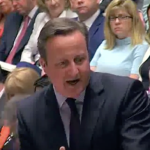A couple of months ago I posted on what was likely to be the political points scoring during the election campaign. Having watched the first televised election debate, it was a depressing experience to hear the dearth of ideas in addressing the single question which dealt with education. It came from a young man, Joel Weiner, in his final year at school, and it’s worth quoting in full:
I’m in my final year of school. I found that the system is incredibly grades-driven, so much so, that often education for its own sake is at sacrifice. We are over -examined and under-taught. What will the party leaders do to improve education?
A perfectly straight-forward and intelligent question, you might think. Neither Gordon Brown nor David Cameron addressed it, preferring instead to talk about having the highest standards for our schools (as if anyone would want the lowest standards), and the need to improve discipline. Nick Clegg at least referred to the need for learning to be more creative, but he quickly got sidetracked onto the excessive bureaucracy in the system. Is it too much to expect party leaders to question the purpose of education? To acknowledge that what goes on in test-driven classrooms is antithetical to the notion of education for its own sake, and that maybe young Joel had a point? Or indeed point out that one potential cause for ill-discipline might be the chronic boredom which stems from school-as-exam-factory?
The business of how we learn, what we really need to learn, and how we might measure skills and knowledge was probably never going to enter their heads in a gladiatorial sound-bite contest. But you got the distinct impression that it would never enter their heads because they’re still stuck in a 19th century mind-set of education.
The day after the debate I watched an interview with Charlie Leadbeater which was chock-full of the kind of new ideas we need about the future of schooling – genuinely inspiring, and if just one of the candidates had cited even one of Charlie’s ideas, I would have believed they had at least some grasp of what they were discussing. As it stands there is a political paucity of innovation in each party’s proposals.
Without wishing to show favour to any of the parties, one might at least hold out some hope for the Liberal Democrat commitment to an Education Freedom Act, which effectively bans politicians from interfering in the day-to-day running of schools. Now that‘s a radical idea, and one which is likely to at least do no harm!


